
Recently, live streams on a YouTube account received a lot of attention.
According to a report by What China, an internet celebrity Darren Watkins Jr., better known as Speed, started traveling in China and started live-streaming on his account IShowSpeed with over 37 million YouTube subscribers.
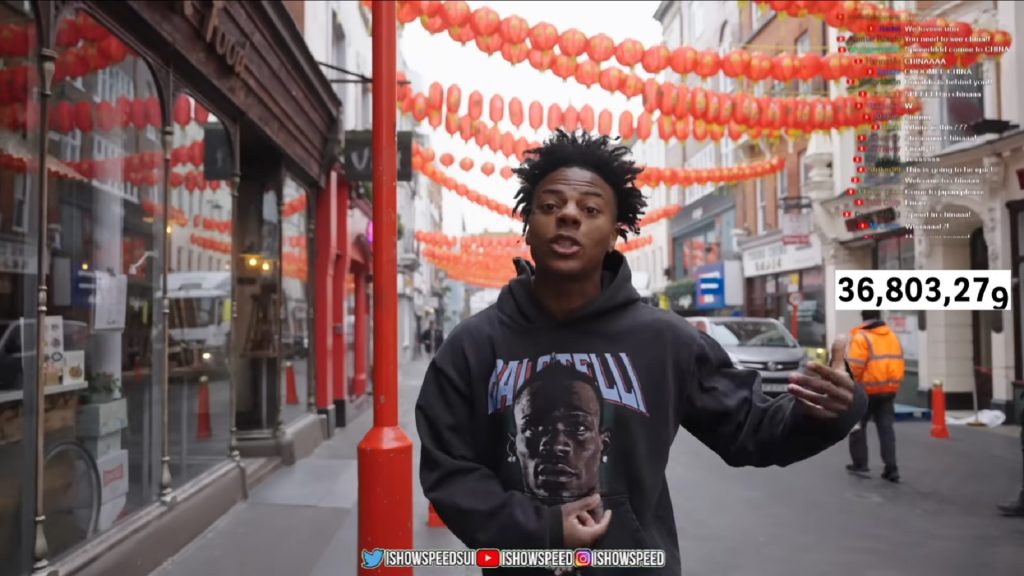
However, every 7-8 hour unscripted live streams will inevitably encounter bad remarks and unexpected situations, let’s take a look.
The Beginning of Knowing
Firstly, the relationship between Chinese netizens and Speed started from a Chinese song called “阳光彩虹小白马”. In one of Speed’s live streams, Speed listened to this sone since it was recommended by netizens. Due to the fact that one of its lyrics “那个” is pronounced very similar to the “N-word”, Speed showed a very shocked behavior and expression after hearing that.

From an article called It’s Just a Word, Right? , the “N-word” derived from the atrocities of slavery, created by white slave owners during the Atlantic slave trade, thus it carried strong racist connotations. Then, the conception of hate speech was defined as speech that ‘expresses, encourages, stirs up, or incites hatred against a group of individuals distinguished by a particular feature or set of features such as race, ethnicity, gender, religion, nationality, and sexual orientation’ (Parekh, 2012, p. 40). So, if someone uses this word to refer to a black person online, it is definitely a form of hate speech, devaluing and discriminating against black friends to a large extent.

However, the Chinese word “那个” in this song only means “that one” in English, and there absolutely isn’t any intention of inciting hatred, just a somewhat similar pronunciation. During his live stream, far from avoiding this song, as an African American, he seemed to be really feeling the music. After that, as this song was played over and over again, the brainwashing melody seems to make him fall in love with it, and it also makes his live stream effect very attractive. At the same time, more and more Chinese netizens also fall in love with this high-energy livestream.
Meiyue Li’s statement
So far, Speed’s live streams have traveled to Shanghai, Beijing, Henan, Sichuan, Chongqing, Hong Kong and Shenzhen, and every live stream was very exciting and had unexpected live stream effects. In fact, before Speed came to China, Chinese citizens had already known that this ISpeedShow’s China Tour was a superexcellent opportunity to promote Chinese culture to the world, so many Chinese citizens would learn about Speed’s itinerary in advance and wait to meet him. That’s why we can see a variety of rich food, regional characteristics, and Chinese culture in his live stream.
However, in such a happy live stream atmosphere, there was a person’s words and behavior in the live stream that aroused the anger of Chinese netizens. This person is Meiyue Li. He grew up in the United States and has both Chinese and Western ancestry. He is a Douyin content creator, and his account has more than 700 fans. His Douyin account was mainly used to test passers-by’s English abilities on the street of Chinese cities in the early stage, and then he transformed into filming videos wearing Chinese clothing specific Chinese clothing abroad.

During the live stream in Beijing, Meiyue Li met Speed and then stayed with Speed because he is good at both Chinese and English, translating the dialogue between Speed and Chinese citizens. In today’s Internet era, it is understandable that content creators to chase clout. Speed came to China for the views, and Meiyue Li served as his interpreter for the same reason. However, Meiyue’s three controversial actions during the live stream were unbearable for Chinese netizens.
First, when Speed walked into the barber shop and asked the boss if he could cut his hair, the boss said: “Because of dreadlocks, it too hard to cut.” But Meiyue Li translated the words: “He said your hair is too raggedy.” Obviously, Meiyue’s translation completely twisted the boss’s meaning. Just like the “N-word”, the word “raggedy” was used to describe black groups during eras of systemic economic oppression. Such words were intended to devalue them as “lower” and “uncivilized” communities and became tools of racial oppression. Because of that, using such words to describe black people on the internet probably be regarded as hate speech, inciting hatred against black communities.
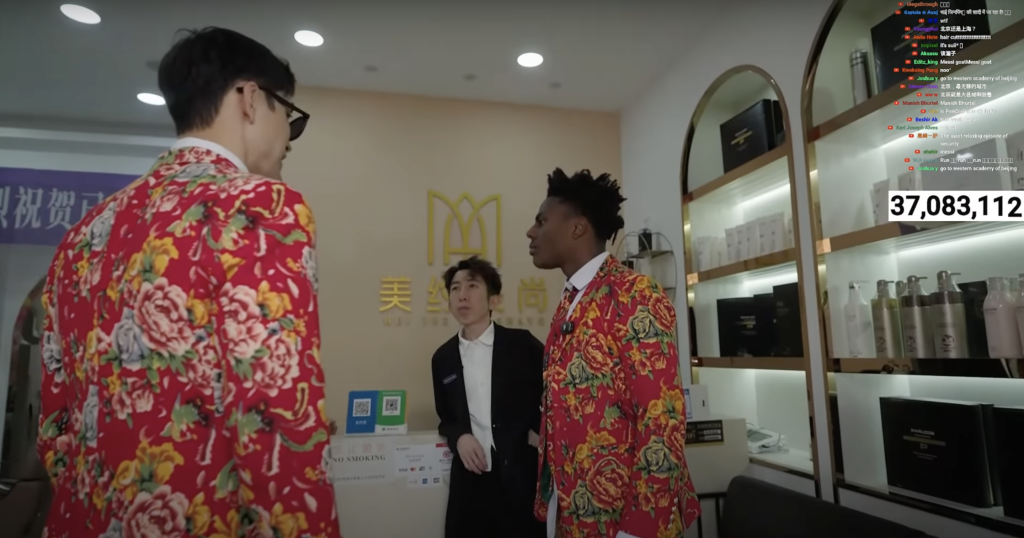
After hearing Meiyue’s translation, Speed showed an incredible expression and called another person beside him to translate for him, because he didn’t believe that strange Chinese people would use this word to describe his hair. He was even self-doubted after walking out of the barber shop: “Is my hair too raggedy?” During this period, Meiyue Li kept making defensive excuses on the sidelines: “I was doing direct translation; I used to do translation for Alibaba, so I’m pretty professional.” Such behavior would directly lead to netizens who can only understand English and even Speed himself mistakenly thought that the Chinese boss really said such words. This would significantly distort foreigners’ perceptions of Chinese people. Therefore, many Chinese neticens have taken to overseas platforms to clarify: “Chinese people would never use hate speech toward foreign strangers.
Second, When Speed and Meiyue Li were on their way to the next destination in the car, Meiyue asked Speed: “So you went to Korea, there is a chick there. Do you want me to introduce a chick in China?” Then, Speed answered: “No, I already went on a blind date in China.” In Chinese, the pronunciation of “chick” is like that of “hooker”, so sometimes Chinese people also use the word “chick” to represent “hooker”, especially in some film. So, if the English word “chick” is translated into Chinese to describe women, most Chinese people would perceive it as disrespectful toward Chinese woman—a derogatory term that belittles Chinese females and fuels gender antagonism. Therefore, many Chinese netizens commented on Meiyue’s previous short video: Your mother is a chick. Something like that.

After that, two short videos showed that many Chinese content creators who live abroad interviewed a lot of people about this word, and they got some different responses and perspectives. Some people think men should avoid using this word, but women can use it; some people think it depends on if there’s a woman in the area, it’s a bit derogatory; some people think that is not offensive; some people think it’s like more of an old fashion, older men usually use it; some people think it’s kind of disrespectful, and kind of objectifies women.
Thus, People of different ages and regions have different understandings of whether this word is derogatory when describing women, because ‘hate speech is very context dependent, and intimate local knowledge is required to understand and address it fully’ (Sinpeng, A. et al., 2021, p. 39).
Third, in previous tour live streams, Speed consistently adopted an interactive format with his fans, and both himself and the fans would do come very abstract behaviors to achieve effective live stream effects. In this live stream, Meiyue Li told Speed directly: “Your fans are f***ing scary, they are not normal.” Speed didn’t fall into the trap and replied: “you are not normal, buddy.” Meiyue seemed to want to incite Speed’s hatred to his fans, but obviously it didn’t work. What truly outraged Chinese netizens was what he said has a strong sense of superiority and had no respect for Speed’s fanbase, nor even for his own followers.
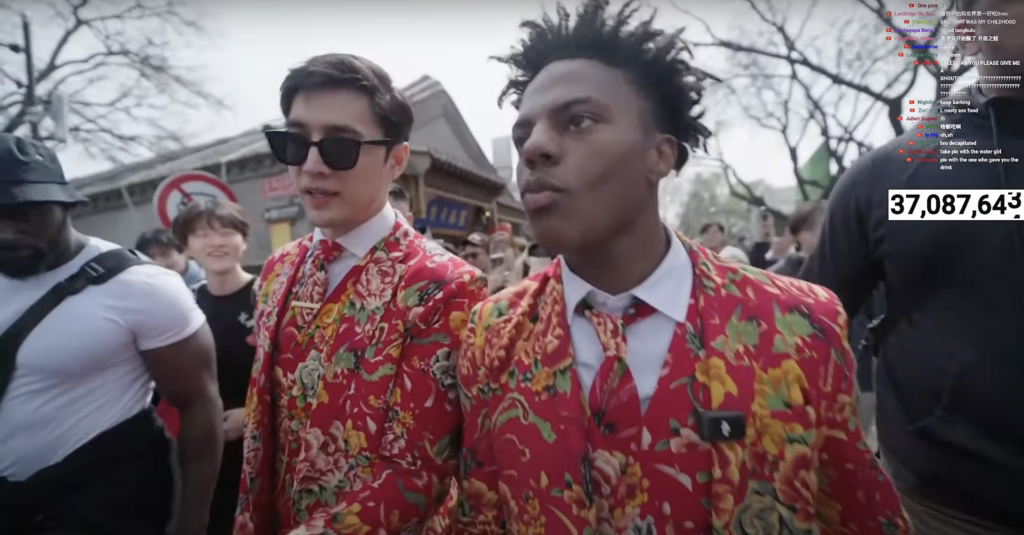
Ironically, on April 1st April Fool’s Day, Meiyue Li posted a short video of his statement. First, he said that his interactions with Speed were all based on the previous live stream style of Speed, and he just wanted to interact in a playful teasing way. He just wanted to make a joke, but it was not funny, even a little embarrassing. He apologized for translating the barber shop boss’s word as “Speed’s hair is very raggedy.” Then, he explained that his use of the word “chick” was not intended to demean women, only because he grew up in the United State and this word was commonly used in movies to refer to women. Last, he said the abnormal fans he mentioned did not refer to Chinese fans, but to fans he watched Speed’s other previous live streams, and Chinese fans were already much better than them.

The Cosplayer’s Behavior
During Speed’s Chengdu live stream, a young girl dressed as an anime character approached Speed and said: “I’m sorry about that, but I’m racist. I’m a “N-word killer”, and I love your girlfriend, because your girlfriend is white people.” After confirming several times, Speed still didn’t want to believe that the young girl was speaking English. After that, the online community erupted in outrage, with netizens widely condemning the young girl for tarnishing Chengdu’s reputation and embarrassing China. Some even escalated to denouncing Chengdu as a whole, attacking the anime fan community, and attempting to doxx this girl by collecting her personal information.
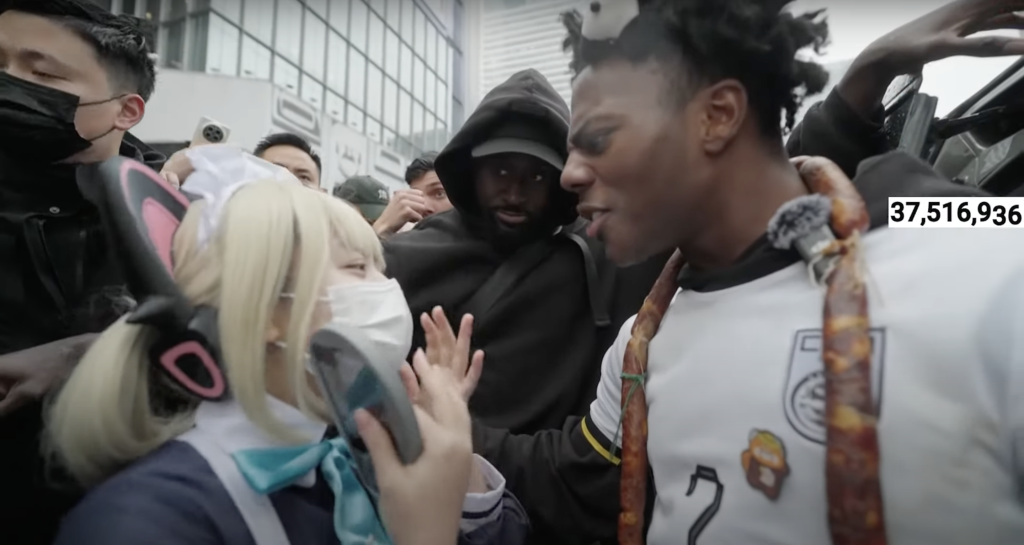
Analysis
On the internet, it is difficult to judge whether many remarks are hate speech, because the Internet has its limitations, making it difficult for netizens to learn about the speaker’s true intentions, and ‘its racist and similar arguments are often couched in ‘scientific’ language or presented as jokes or as ironic commentary’ (Flew, Terry, 2021, p. 92). Just like Meiyue Li and the little girl mentioned above, they must had realized that their words were discriminating against a specific group, but whether their fundamental intention was to incite discriminatory hatred to them, or just to do some live stream effects, as netizens, we would never know, so this would cause misunderstandings. No matter how they defended themselves, some netizens were still unwilling to believe them.
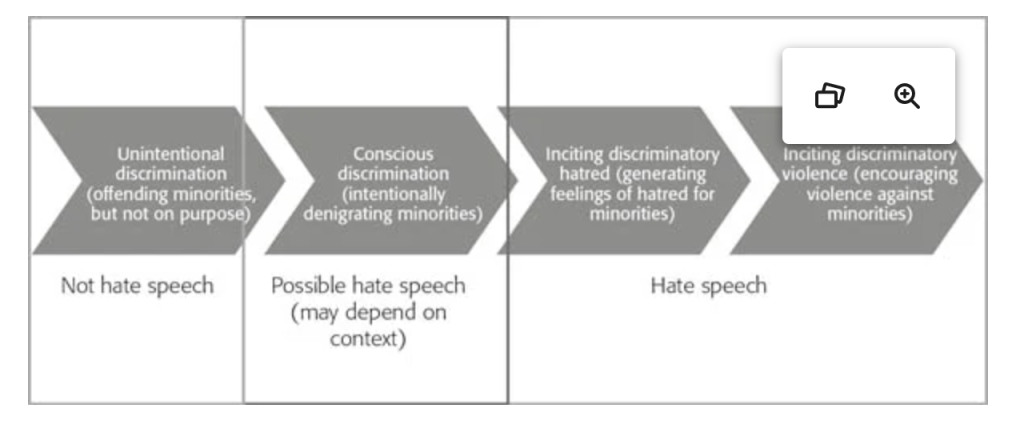
Hate speech can be divide into two harm ways: causal harms, which arise as a direct consequence of hate speech being uttered, and constitutive harms, which are occasioned as a result of the utterance being made (Sinpeng, A. et al., 2021, p. 39). If the above-mentioned words of Li Meiyue and the young girl are regarded as hate speech, then what Meiyue said is a causal harm, because his words are suspected of inciting discrimination against specific groups, and what the young girl said is a constitutive harm, because the words would directly harm Speed.
On the internet, hate speech will trigger larger online harassment. After the incident of Meiyue Li and the young girl, many Chinese netizens began to scold them, and some began to attack Li Meiyue’s family, the anime fan community and the city of Chengdu, like “Anime fans are idiots”, “Chengdu is s**t.” A growing wave of toxic hate speech is emerging, drawing more and more people involved in the controversy. Even the personal information of another innocent girl who likes anime was revealed and published on the online platform, and this girl was also attacked.
Fortunately, a mysterious force controls all this. In the video material of CCTV’s report on the IShowSpeed’s China Tour, Meiyue Li’s face was mosaiced. Although his Douyin account has not been banned yet, it also expressed its official attitude. Meanwhile, there are no clips about the interaction between the young girl and Speed on the internet. On the one hand, it may be out of protection for the girl, and on the other hand, it is also a kind of control over public opinion. If it is allowed to ferment, the consequences will be unimaginable.
Therefore, hate speech on online platforms is very necessary to regulate and govern. The governance of hate speech requires platform supervision, government assistance, and legislative basis. The Internet is not a lawless place, only by effectively controlling hate speech can we cultivate a healthy digital environment.
Reference
Flew, Terry (2021) Hate Speech and Online Abuse. In Regulating Platforms. Cambridge: Polity, pp. 91-96
Parekh, B. (2012). Is There a Case for Banning Hate Speech? In The Content and Context of Hate Speech (pp. 37–56). Cambridge University Press. https://doi.org/10.1017/CBO9781139042871.006
Sinpeng, A., Martin, F. R., Gelber, K., & Shields, K. (2021). Facebook: Regulating Hate Speech in the Asia Pacific. Department of Media and Communications, The University of Sydney.

Be the first to comment